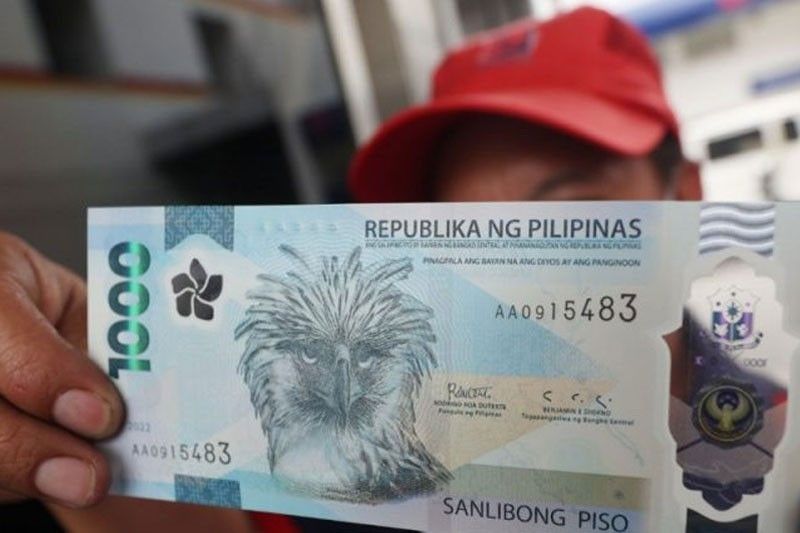BSP: New polymer bank notes 'tougher, safer'

MANILA, Philippines – The Bangko Sentral ng Pilipinas defended its new polymer banknotes on Thursday, December 26 by sharing data that shows they last five times longer and are harder to counterfeit than paper bills.
The BSP's statement focusing on the bills' technical benefits comes as critics — including historians — express concerns over the removal of national heroes from Philippine currency in favor of wildlife designs.
Among those to be removed is democracy icon Benigno "Ninoy" Aquino Jr. — the assassinated opposition leader and main political rival of Ferdinand Marcos Sr. — whose image is currently on the five-hundred peso bill.
Safety features. Based on the central bank's monitoring of the 1,000-peso polymer note launched in April 2022, it found that the 1000-peso polymer note is much harder to counterfeit than paper bills.
There has been only one case of counterfeiting for every 82 million polymer notes in circulation, compared to one case for every 19,000 paper bills, according to the BSP's statement.
"Polymer banknotes incorporate advanced security features, such as flora clear window, vertical clear window, embossed mirrored denomination, and iridescent figure, among others, reducing the risk of counterfeiting," the BSP said.
Durability tests show polymer notes lasting up to 7.5 years compared to paper notes' 1.5 years. Since 2022, only 0.08 percent (689,571 pieces) of issued polymer notes were returned as damaged, while 54.4 percent (about one billion pieces) of paper notes required replacement during the same period.
According to a 2023 De La Salle University study commissioned by BSP, polymer notes also show environmental benefits, with a 38.36 percent lower global warming potential than paper currency.
The BSP said this lower environmental impact is attributed to the longer lifespan of polymer notes, which reduces resource consumption throughout their life cycle.
The central bank also highlighted that polymer notes have smoother, non-absorptive surfaces that make them less likely to get damaged by water, oil, and dirt. According to the Department of Health, these notes can also be sanitized with less risk of damage, a feature confirmed through evidence review including data from the COVID-19 pandemic, the BSP said.
Removing history. The BSP's focus on the banknotes' technical merits comes after widespread criticism of the cultural and political implications of the new designs. The August Twenty-One Movement (ATOM) — a group opposing the return of the Marcoses — strongly criticized the design shift and said it amounts to "forgetting" the country's most prominent historical figures.
The group cited Apolinario Mabini and Andres Bonifacio who were once on the ten-peso bill, Manuel Quezon on the twenty-peso bill, and the World War II heroes Jose Abad Santos, Josefa Llanes Escoda, and Vicente Lim who were featured on the 1,000-peso note before being replaced by the Philippine eagle in 2022.
ATOM also highlighted how during the Marcos dictatorship, "we lost a generation of our best and brightest for resisting the dictatorship."
The group named several martyrs including Edgar Jopson, Bobby dela Paz, Johnny Escandor, Macliing Dulag and Ninoy Aquino.
"For more than two decades, the dictator's family has been hard at work trying to rewrite history and erase from our collective memory the heroes who bravely fought for our freedom," ATOM said.
The group questioned whether "they are trying to make us forget that the blood of heroes runs in our veins so they can replace it with the blood of slaves and let tyrants rule again."
Public historian Professor Xiao Chua has also expressed similar concerns about preserving the country's history and national memory through currency.
Last year, the Department of Education confirmed it had revised its Grade 6 Araling Panlipunan curriculum to drop the name of "Marcos" from the lesson "Diktadurang Marcos," with curriculum officials saying the lesson guide had been merely "aligned" and "organized."
Since their return from exile in 1991, the Marcos family has consistently denied atrocities during Martial Law and sought to challenge historical accounts of human rights abuses and corruption during that period.
Circulation ongoing. The new polymer versions of the 500-, 100-, and 50-peso notes entered limited circulation on Monday, December 23.
The BSP is planning nationwide distribution by 2025, while maintaining that existing paper notes featuring national heroes will remain legal tender.
The central bank spent P4.98 billion for the initial batch of polymer banknotes, according to the Commission on Audit's 2023 audit report. Five companies from France, Germany, and the United Kingdom were awarded contracts for materials and production of the new bills. — with reports by Jean Mangaluz
- Latest
- Trending
























